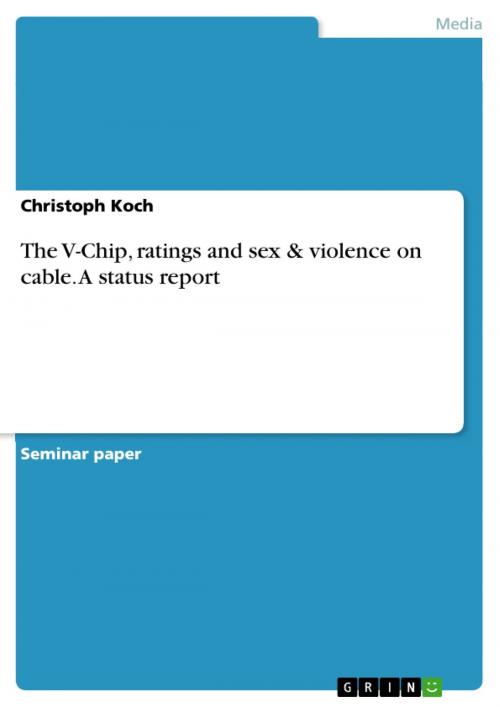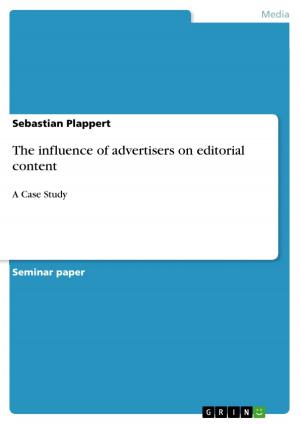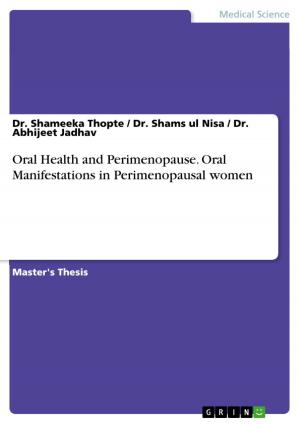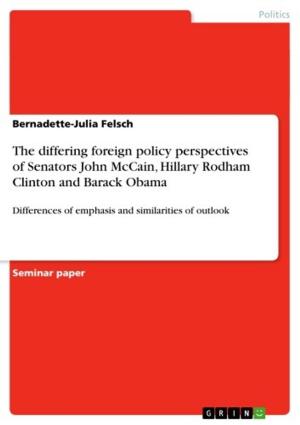The V-Chip, ratings and sex & violence on cable. A status report
Nonfiction, Entertainment, Performing Arts, Film| Author: | Christoph Koch | ISBN: | 9783638124492 |
| Publisher: | GRIN Publishing | Publication: | May 2, 2002 |
| Imprint: | GRIN Publishing | Language: | English |
| Author: | Christoph Koch |
| ISBN: | 9783638124492 |
| Publisher: | GRIN Publishing |
| Publication: | May 2, 2002 |
| Imprint: | GRIN Publishing |
| Language: | English |
Seminar paper from the year 1999 in the subject Communications - Movies and Television, grade: 1- (A-), Ohio University (School of Telecommunication), course: Cable Communication, 22 entries in the bibliography, language: English, abstract: In last Thursday's edition of USA Today concerned parents had no doubt about what was responsible for the High School shootings in Colorado. 49% agreed that TV, movies and music 'have a great deal of blame' for the shootings (topped only by 'availability of guns' and 'parents') and 52% spoke out for 'more restrictions on TV and movie violence' (USA Today 1999, p. 3A). Violence on television has been an issue for a very long time. This has different reasons: First, children (who seem to be the center of the debate most of the times) are a society's most precious good. Threatening the well-being of their children is probably the worst thing you can do to people. That's why at all times adults were afraid their children could get harmed by whatever media they were exposed to - be it comic books, early movie theaters, rock music or television. I don't want to go into great detail and talk much about research on media effects, but I think it is simplistic and dangerous to assume a direct causality between violence portrayed on television and violent behavior in real life. But tragic incidents like the shooting in Colorado last week will give a boil-up to the discussion of stronger control over violent TV programming and effective measures that can be taken to prevent children from consuming this violence. This paper deals with the technology of the so-called V-Chip and the fairly new television ratings system that were made mandatory by the Telecommunications Act of 1996. The advantages and disadvantages of these appliances will be discussed as well as cable's special role in this significant issue.
Seminar paper from the year 1999 in the subject Communications - Movies and Television, grade: 1- (A-), Ohio University (School of Telecommunication), course: Cable Communication, 22 entries in the bibliography, language: English, abstract: In last Thursday's edition of USA Today concerned parents had no doubt about what was responsible for the High School shootings in Colorado. 49% agreed that TV, movies and music 'have a great deal of blame' for the shootings (topped only by 'availability of guns' and 'parents') and 52% spoke out for 'more restrictions on TV and movie violence' (USA Today 1999, p. 3A). Violence on television has been an issue for a very long time. This has different reasons: First, children (who seem to be the center of the debate most of the times) are a society's most precious good. Threatening the well-being of their children is probably the worst thing you can do to people. That's why at all times adults were afraid their children could get harmed by whatever media they were exposed to - be it comic books, early movie theaters, rock music or television. I don't want to go into great detail and talk much about research on media effects, but I think it is simplistic and dangerous to assume a direct causality between violence portrayed on television and violent behavior in real life. But tragic incidents like the shooting in Colorado last week will give a boil-up to the discussion of stronger control over violent TV programming and effective measures that can be taken to prevent children from consuming this violence. This paper deals with the technology of the so-called V-Chip and the fairly new television ratings system that were made mandatory by the Telecommunications Act of 1996. The advantages and disadvantages of these appliances will be discussed as well as cable's special role in this significant issue.















